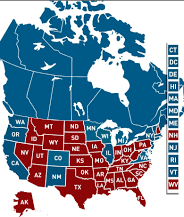Monocropping Culture

You start with seeds of one type or another, maybe corn or wheat or whatever serves your market, and they are genetically modified. They are built to withstand the pesticides and herbicides you will apply to them at several stages of the crop’s development. You have water rights sufficient to spray copious amounts on even the hottest days to meet their need for moisture. And you have fertilizer, too, to pump them full of nitrogen like steroids into a bodybuilder. This with any luck at all will be a bumper crop.
Everything is not coming up roses, of course. Lots of problems attend industrial farming. (HERE) With each harvest we reap the unintended consequences. The vast majority of all the water used in drought-riven America is applied to crops and livestock. There are serious questions about threats to our health from chemical cocktails applied to our food. Concerns, too, attend the practice of clearing grasslands and forests for ever larger plots to till and farm. It is estimated that some forty percent of our total pollution is directly attributable to agriculture. (HERE) Sometimes it’s all a lot to swallow.
But what of culture? By what stretch of the imagination is agriculture applicable to that subject. The knee-jerk response would be that we are what we eat. But for the purposes of our consideration here, monocropping struck us as an apt metaphor for what our society is suffering these days, cultural deprivation that is manifest in the homogeneity of the group ideals to which we cling.
Red-blue, Republican-Democrat, rural-urban, rich-poor, up-down, a dichotomous nation coming apart at the seams. Like a vast plot of soybeans or cabbage or hemp, stretching as far as the eye can see, is one or the other of your assigned belief systems in which not a single weed of dissent or disagreement is tolerated. We have sprays for that stuff, toxic bombs that smother and snuff out diversity of thought.

Genetically modified thinking is the order of the day. The seeds of your truth cultivated free of interference in a vast field of sameness where not a hint of foreign organism is found. Otherness forbidden. Agree not to disagree.
Does that seem too dramatic? Perhaps. Perhaps not. It’s hard to find a place anymore where orthodoxy doesn’t dominate. One agrees or one is wrong. Your hate speech is my cancel culture. It is seldom if ever that people speak up except where they can confirm what their colleagues already believe.
The serial novel Cascadia: A Future Fable of Destruction and Redemption (HERE) rests on the idea that the United States under great internal pressure will come apart, divide into two competing nations of idealogically driven nationalism. It’s fun to speculate about such things but in the light of day one wonders what improvements would be gained by monocropping governance.

If this map were a model of how the nation might divide along ideologies, we need to recognize that plenty of blue can be found in red states and red in blue states. How would such a separation account for them? Perhaps a period of open citizenship is offered everyone who wants to relocate from one to the other. If so, stock in U-Haul might be a great investment.
We might also question as this map suggests the assumption that Canada is perfectly aligned with blue state thinking and whether that block of blue is now one nation or two that are thought to be simpatico. Nation-building is tough enough but rearranging and reconstituting nations is really a challenge.
Another issue, a very big one, is secession. We are told it never can happen, that the Civil War proved it never will be allowed. Certainly that period of our history was a nation severely divided. Like today, it was driven by issues of power, economics, and geography. Yet, we suspect the motivation to hold the nation together at all costs may no longer apply.
In Cascadia, the fictional President Gherkin is advised by his Chief of Staff that governors in the Pacific Northwest are threatening to secede. “Let ’em,” the President replies. “They’re all Ds anyhow. Let ’em go. We’ll create a Republican stronghold for the rest of time.” Purely fiction, of course, but seeming more plausible all the time.